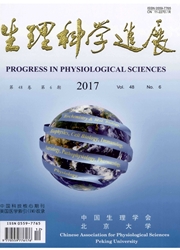

 中文摘要:
中文摘要:
蛋白激酶A(protein kinase A,PKA)为重要细胞信号传导因子,在机体脂类代谢调控中发挥关键作用。PKA激活关键性脂肪水解酶,如激素敏感脂肪酶(hormone sensitive lipase,HSL)与脂肪甘油三酯脂肪酶(adipose triglyceride lipase,ATGL),以促进脂肪动员。PKA上调解偶联蛋白-1(uncoupling protein 1,UCP-1)表达,促进棕色脂肪细胞线粒体热量生成,上调机体产热量。PKA密切参与肝脏细胞脂类合成代谢调控过程。值得关注的是,PKA信号传导异常,是脂质代谢异常相关疾病,如肥胖、心脑血管疾病、2型糖尿病等疾病的重要发病机制之一。药理学研究亦显示,PKA与主要调血脂药的药理作用密切相关。本文综述五年来有关PKA参与脂类代谢调控的研究进展,以期深入了解PKA在脂类代谢中发挥的作用,并为相关疾病的诊疗提供新思路。
 英文摘要:
英文摘要:
Protein kinase A(PKA), as a pivotal factor in the cellular signal transduction, plays an essential role i tive lipase ( up-regulates n the HSL) regulation of lipid metabolism. PKA activates the key lipases including hormone sensi- and adipose triglyceride lipase (ATGL) to promote the fat mobilization. PKA signaling the mitochondrial thermogenesis by 1 ), which critically contributes to the body heat enhancing the expression of uncoupling protein-1 ( UCP- production. PKA is closely involved in the regulation of lipogenesis in the liver. Notably, the dysregulation of PKA signaling is associated with the pathogenic mechanisms underlying the obesity, cardiovascular diseases and diabetes mellitus. The pharmacological studies show that PKA is linked to the pharmacological effects of the major lipid regulating agents. In this review, the studies on roles of PKA in the regulation of lipid metabolism are summarized with an emphasis on progress made during the last five years for providing insights into the mechanism by which PKA regulates the lipid metabolism as well as the novel therapeutic strategy for lipid-metabolic diseases.
 同期刊论文项目
同期刊论文项目
 同项目期刊论文
同项目期刊论文
 期刊信息
期刊信息
